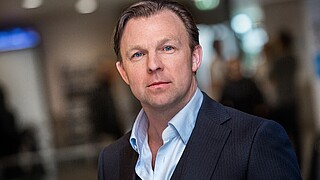An organisational psychologist by training and background who concedes that he might be thought of as something of an idealist, Prof. Dirk van Dierendonck believes strongly that there is more to people, and the organisations in which they strive to earn a living, than numbers on a balance sheet.
‘Finance, order and logistics are of course important,’ he says. ‘But you must remember that people are important, try to reinforce the value of what they do, to enhance their well-being.’
Core elements of this well-being, he argues, include a sense of meaningful purpose, confidence in the value of the work people are doing and personal growth and development.
In his recent inaugural address on the subject (“Building people-oriented organisations”, which could have equally been subtitled “Putting the human back into human resources”), Prof. van Dierendonck pointed out that money has taken up such a central role within the modern world and its organisations that we sometimes forget what it means to be human.
‘One has only to look at the skyline of cities like Rotterdam or Amsterdam to realise that our places of worship have changed,’ he said. ‘No longer is the view dominated by churches or castles; the skyscrapers of financial institutions have taken over. We seem to almost forget that what we want from life is simply to be happy, to flourish, to become the best we can be.’
More than employees
People are not just employees to be forced to comply with a common template, he emphasises. They are individuals with individual needs, aspirations and abilities. ‘Organisations could be more successful if only they would recognise that,’ he adds, making a leap from observations on the everyday human condition to the expression of thought on how that might be applied to the front line of commerce. The essential message, then, is that from the perspective of leadership, people should be encouraged to function optimally.
Seeking to make his key points clearer and more pertinent to a world where the landscape of work continues to develop relentlessly, he cites the traditional view of a successful factory as a place where engineers wrestle to establish the most efficient way of working. Taking this narrow view, the most efficient means of production is one that uses robots most extensively and most cost-effectively.
Some Japanese futurologists believe that robots can be large-scale providers of certain elements of personal care. But the prospects for that seem limited, says Prof. van Dierendonck. Individual healthcare, which threatens to become an industry in its own right as populations age rapidly around the globe, no way yet exists in a form where the imperative of the personal touch can be removed. ‘The autopilot can only go so far and then humans need to step back in,’ he sums up.
Maximum value
Despite the best efforts of the engineering and accounting communities, people remain important. In today’s cut-throat world, business owners and managers seeking to extract maximum value from their staff need to create an environment in which those staff can operate in the creative, innovative and competitive manner which is required to succeed.
The consequences for failure are severe. Even a brief survey of corporate history will show graveyards full of once-famous names. ‘People need to be motivated to do more than their contractual minimum,’ he advises. ‘And their employing organisations need to be open to new learning, to take an “and” view rather than an “or” view in pursuit of the broader corporate strategy. Companies which do not have a learning approach will be taken over by a competitor, increasingly often, it would seem, from another country.’
In this context, companies from the People’s Republic of China have in recent times emerged as a serious force in international dealmaking, accounting for one-sixth of all deal activity in the first quarter of this year, according to separate sets of figures from Thomson Reuters, Dealogic and the Mergermarket Group. Key highlights from the Mergermarket report include: China contributed 26.3 per cent to total global deal value; the industrials and chemicals sector dominates, with US$144.7 billion of deals; outbound deals amounted to US$597.4 billion; the China National Corporation made the largest deal of Q1 when it acquired Switzerland-based Syngenta AG for US$45.9 billion.
Returning to the core topic, Prof. van Dierendonck identifies the lack of trust on the part of organisations as a clear sticking point. ‘Organisations are hesitant to trust people because it’s scary,’ he observes. ‘They just might not do the right thing.’ This in turn highlights the need for balance, and the problems that lie in wait for those pursuing balance. ‘There is a dilemma for managers,’ he says. ‘They can’t be too strict or too relaxed in the execution of their duties; they can struggle with the balance between giving autonomy and the need to hold people accountable.’
Which brings the discussion back round to the starting points as standardisation mixes with individual freedom in the drive to create an atmosphere in which employees will try to work that little bit harder for the greater good. In this scenario, two plus two can equal six as efficiency combines with creativity to deliver growth, Prof. van Dierendonck concludes.
Prof. van Dierendonck’s inaugural address can be downloaded here.
This article was first published in RSM Outlook summer 2016. You can download RSM Outlook here.
